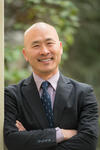Hwansoo Kim
Courses
RLST 102, EAST 390
Atheism and Buddhism
A critical examination of atheism and religions (Buddhism), with a focus on intellectual, religious, philosophical, and scientific debates about God, the origin of the universe, morality, evolution, neuroscience, happiness, enlightenment, the afterlife, and karma. Readings selected from philosophical, scientific, and religious writings. Authors include some of the following: Charles Darwin, Bertrand Russell, Christopher Hitchins, Richard Dawkins, Deepak Chopra, Sam Harris, Owen Flanagan, Stephen Batchelor, and the Dalai Lama.
RLST 175, EAST 431
North Korea and Religion
Ever since the establishment of the Democratic People’s Republic of Korea (DPRK) in 1948 and the Korean War (1950–1953), North Korea has been depicted by the media as a reclusive, oppressive, and military country, its leaders as the worst dictators, and its people as brainwashed, tortured, and starving to death. The still ongoing Cold War discourse, intensified by the North Korea’s recent secret nuclear weapons program, furthers these negative images, and outsiders have passively internalized these images. However, these simplistic characterizations prevent one from gaining a balanced understanding of and insight into North Korea and its people on the ground. Topics other than political, military, and security issues are rarely given attention. On the whole, even though North Korea’s land area is larger than South Korea and its population of 25 million accounts for a third of all Koreans, North Korea has been neglected in the scholarly discussion of Korean culture. This class tries to make sense of North Korea in a more comprehensive way by integrating the political and economic with social, cultural, and religious dimensions. In order to accomplish this objective, students examine leadership, religious (especially cultic) aspects of the North Korean Juche ideology, the daily lives of its citizens, religious traditions, the Korean War, nuclear development and missiles, North Korean defectors and refugees, human rights, Christian missionary organizations, and unification, among others. Throughout, the course places North Korean issues in the East Asian and global context. The course draws upon recent scholarly books, articles, journals, interviews with North Korean defectors, travelogues, media publications, and visual materials.
RLST 327, EALL 238, EAST 394
Buddhist Monastic Experience
Is monastic life relevant in contemporary society, where religion is increasingly considered less significant in our secular lives? Can we find valuable aspects of a monastic lifestyle that can be integrated into our daily lives? If so, what are these aspects, and how can we incorporate them? This seminar represents a collaborative effort to gain insight into one of the major monastic traditions: Buddhist monasticism. Throughout this seminar, we delve into various facets of Buddhist monastic life, examining its origins, historical development, monastic identity, rules and regulations, practices, and the dynamics between monastics and the laity. We also explore the tensions that often arise between the ideals of monasticism and the realities it faces in today’s world. As part of this exploration, we embark on an eight-week monastic life project, during which students create their own set of daily rules (precepts), adhere to these rules, engage in meditation and other relevant practices, and establish a regular communal gathering with fellow students.

